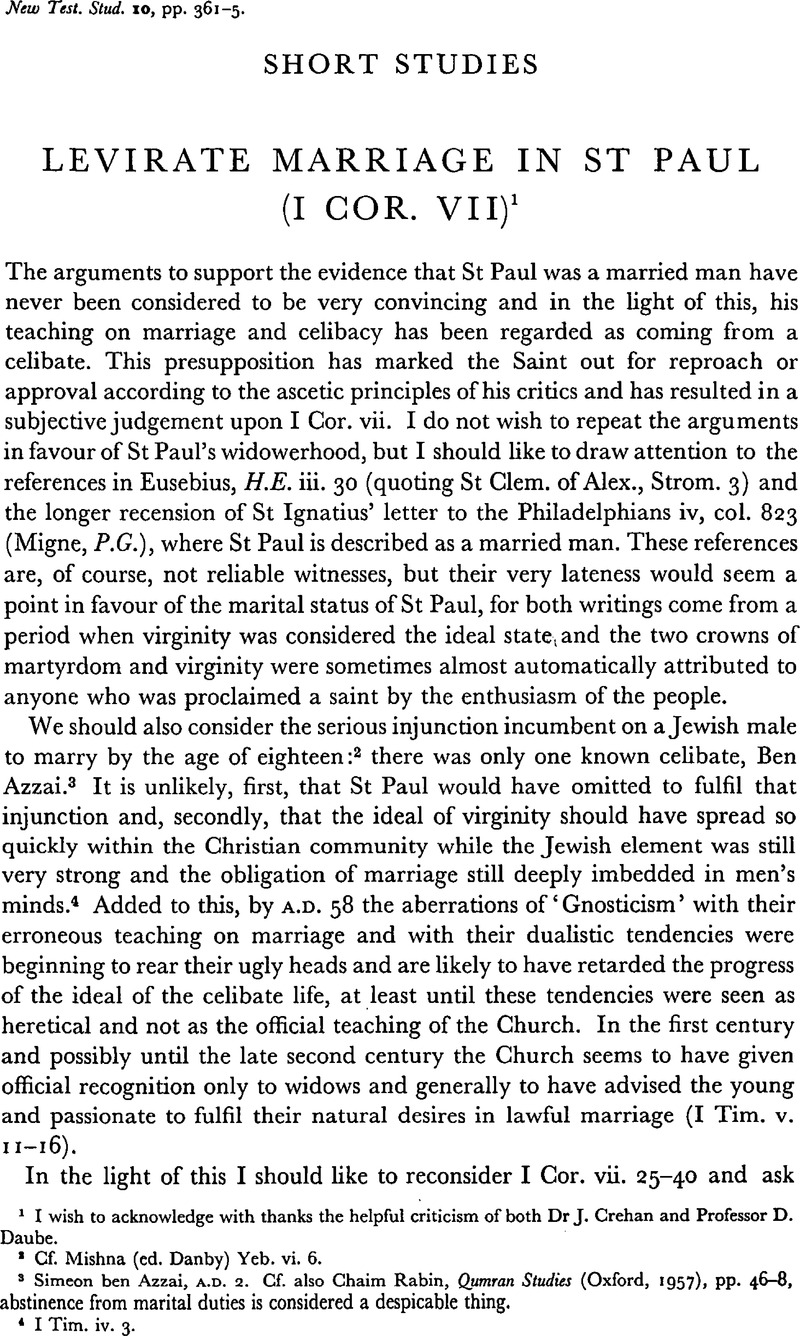Article contents
Levirate Marriage in St Paul (I Cor. vii)1
Published online by Cambridge University Press: 05 February 2009
Abstract

- Type
- Short Studies
- Information
- Copyright
- Copyright © Cambridge University Press 1964
References
page 361 note 2 Cf. Mishna (ed. Danby) Yeb. vi. 6.
page 361 note 3 Simeon ben Azzai, A.D. 2. Cf. also Chaim Rabin, Qumran Studies (Oxford, 1957), pp.46–8 abstinence from marital duties is considered a despicable thing.
page 361 note 4 I Tim. iv. 3.
page 362 note 1 Cf. Eduy. iv. 10; Ket. v. 6, where a limit is imposed on the period of abstinence.
page 362 note 2 Cf. Phil. iii. 4–6.
page 362 note 3 Some commentators find the exception to lie in keeping the pagan partner.
page 362 note 4 Leon, Harry J., The Jews of Ancient Rome (Philadelphia, 1960).Google Scholar
page 363 note 1 Ibid. p. 230.
page 363 note 2 Ibid. See inscriptions, 81, 319 and 242.
page 363 note 3 Ign. ad Smyr. 13 Sources Chrétiennes.
page 363 note 4 Ps.-Justin, De Resurrectione, 3.
page 363 note 5 Cf. also Tert. De Mono. where the terms ‘virginitas’ and ‘continentia’ seem interchangeable, e.g. 3 ‘totam et solidam virginitatem sive continentiam’ and Exhort. Cast. 1, 16 f. where three types of virginity are described: ‘virginitas a nativitate; virginitas a secunda nativitate; monogamia’.
page 363 note 6 If parthenos in the sense of ‘continent’ were widespread, then the Therapeutae might well be ‘continents’ rather than ‘virgins’.
page 363 note 7 Leon, op. cit. p. 129.
page 363 note 8 Cf. Funk, Grammar of New Testament Greek, para. 373 (3).
page 363 note 9 Cf. Burrows, Millar, Dead Sea Scrolls (London, 1956), ‘…they will be caught in two nets; in fornication by taking two wives during their life-time…’, p. 352, and also Tert. De Mono., passim.Google Scholar
page 363 note 10 Cf. Cross, Frank Moore, The Haskell Lectures, 1956–7 (London, 1958), p. 74.Google Scholar
page 364 note 1 The Jewish context of the passage may well have been forgotten when Jewish laws became less important. Dr J. Crehan, S.J., reminds me that a similar case is found over the questions submitted to the Council of Jerusalem, Acts xv. 20. The decision is given over four points of Jewish law (taking πορνεια as referring to Jewish marriage impediments) and sent, not to the Church at large, but to areas where such questions of Jewish law might arise. In the later manuscripts and in patristic references (D, d, g, Ir., Ephr., Ambr., Ambst., Aug.) ![]() is omitted, πορνεια is taken in the moral sense and the decisions are read as general laws binding on the whole Church.
is omitted, πορνεια is taken in the moral sense and the decisions are read as general laws binding on the whole Church.
page 364 note 2 ‘Consortium in Roman and Hebrew Law’, The Juridical Rev. LXII, no. I (April 1950).Google Scholar
page 364 note 3 Cf. Nidd. v. 6 and more particularly v. 7, but the difference in language makes any close analogy difficult.
page 364 note 4 Arndt and Gingrich, Lexicon of New Testament Greek.
page 364 note 5 The brother-in-law must either submit to halitzah or contract levirate marriage; in either case the ketubah is due.
- 3
- Cited by


